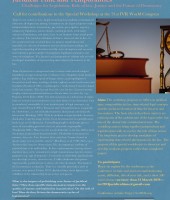Juridical Time and Temporalities. Challenges for Legislation, Rule of law, Justice and the Future of Democracy
Appel à propositions pour le Special Workshop dans le cadre du 31e IVR World Congress.
Présentation
Time is everywhere in law. Legal reasoning, the design and implementation of legislation, constitution-making and discourse all depend on timing. Countless are the legal categories with a temporal dimension: retroactivity, precedent, prescription, adjournment, temporary legislation, sunset clauses, evidentiary statutes of limitations, ban on excessive delays, waiting periods, etc. Also, law is not immune from the velocity of times, social speed or acceleration. The social phenomenon of the acceleration of time is observed also in law: the addictive growth of law, the accelerated rate at which laws are passed, transformed and repealed, the success of summary and accelerated proceedings, the rapid downgrading of doctrines and the sense of urgency and necessity that informs a great number of temporary legislation measures and states of exceptions. Philosophers and sociologists of time have long stressed that urgency, once a temporality of exception, is now the norm.
However, lawyers and jurisprudents seldom rely on well-developed modalities of representing time-related phenomena in the law. The literature on time and law is vast but typically relies on modalities of representing time adopted from elsewhere.
Time theorists have categorized time in relation to many areas and developed modalities of representing time in almost every discipline, from music to politics. E.g. historians speak of longue durée, anthropologists of ‘frenzied’ or ‘stuck’ time, sociology of time explores social acceleration and rhythms (Zerubavel 1981), in philosophy a whole area of study has developed over roughly the last century. This has not really been the case for law. By and large, lawyers employ under-scrutinized notions to discuss time (as notice by, e.g., Postema 2018; Kahn 2008). Yet time enters every part of how we practice and understand law: it functions as a delineator of rights that are initiated and terminated at certain times; can determine what is considered reasonable or not, and is an intrinsic part of legal concepts, e.g. stare decisis (French 2001). Focus on time in legal literature is typically on ‘clock-time’, i.e. scientifically measured, durational and distinctly linear time (Hacking 1990). With its uniform and predictable character, clock-time is apt for usage in law: it can be measured and its quantification lends it an air of objectivity. Controlling people’s clock-time gives a sense of controlling processes that are otherwise ungraspable (Nussbaum 2001). However, the use of clock-time in the law differs from clock-time as measured durational time. Clock-time is measured in minutes, days, etc. Law borrows these units but “it may choose to ignore some and to redefine others” (MacKaay et al. 1990: 262); e.g. a ‘working day’ can be ‘any day of the week except Saturday and Sunday’, a ‘business day’ may be shorter than 24h. An important attribute of ‘juridical time’ is its malleability. In law, a phenomenon having certain duration may yet be considered a single instantaneous fact for certain purposes (e.g. ‘age of majority’). Contrarily to clock-time, ‘juridical time’ can also stop, reverse, start over etc. Unlike clock-time that passes impersonally, juridical time is also always the time of someone. This matters for its normative evaluation: two years in the middle of a healthy adult’s life are not like two formative years in the life of a child. Juridical time also responds to social expectations in ways clock-time does not. Outside legal academia, it has been noted that different meanings of ‘temporary’ should be discerned (Bauböck 2011). It may be based on a combination of social expectations, individual intentions, and legal norms (Stronks 2021). Better understanding of temporal devices in the law, such as references to ‘temporary’, ‘permanent’, is needed
Reflecting on juridical time sheds light on the subtilities of the relationship between law and power. The apparent neutrality in referring to time has many social consequences, a challenge for justice. Albeit well-known, this insight is not systematic explored. Agenda-setters and designers of time standards and rules accommodate the interests of some at the expense of others. Time is a valuable good frequently used to transact over power (Cohen 2018). Starting with the laws of time – how we organize calendars, and set our clocks – that has always attracted the attention of reformers and revolutionaries (Perovic 2012, Hemel & Hamilton 2023), to transitional justice processes, constitutional moments, and the manifold and competing temporalities of law across all of its branches, juridical time poses normative questions of relevance. Specially in contexts marked by crises, juridical time poses challenges for legislation, rule of law and the future of democracy
Objectifs
The workshop proposes to reflect on juridical time, temporalities in law, time-related legal concepts and the social acceleration of time for lawyers and law-makers. The basic hypothesis is that these matters are critical parts of the architecture of the legal order, but also of the democratic constitutional state. What impact does politicking over forms of juridical time have? How does specific time-measures impact on the quality of norms and legislation in particular? On the legal foreseeability and the role of law? How do they fit into the democratic cycles of legislatures? These are some of the questions that we hope to highlight. We want to bring together jurisprudents and legal theorists with an interest in time in law, with the longterm goal to develop modalities of representing time-related phenomena in the law.
The purpose of this special workshop is to showcase and develop works-in-progress rather than completed papers
Pour participer
Veuillez vous inscrire sur le site web de la conférence https://ivr2024.org et envoyer un courriel indiquant votre nom, votre affiliation, le titre de votre intervention et un court résumé de 300 mots au plus tard le 31 mars 2024 à ivr2024juridicaltime@gmail.com
|
|
|
Vers une théorie réaliste du droit des étrangers 01 septembre 2023 - 30 juin 2024 |
|
|


